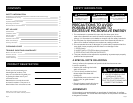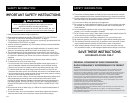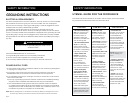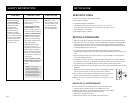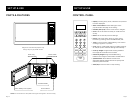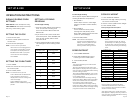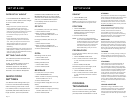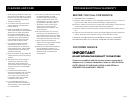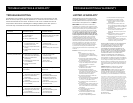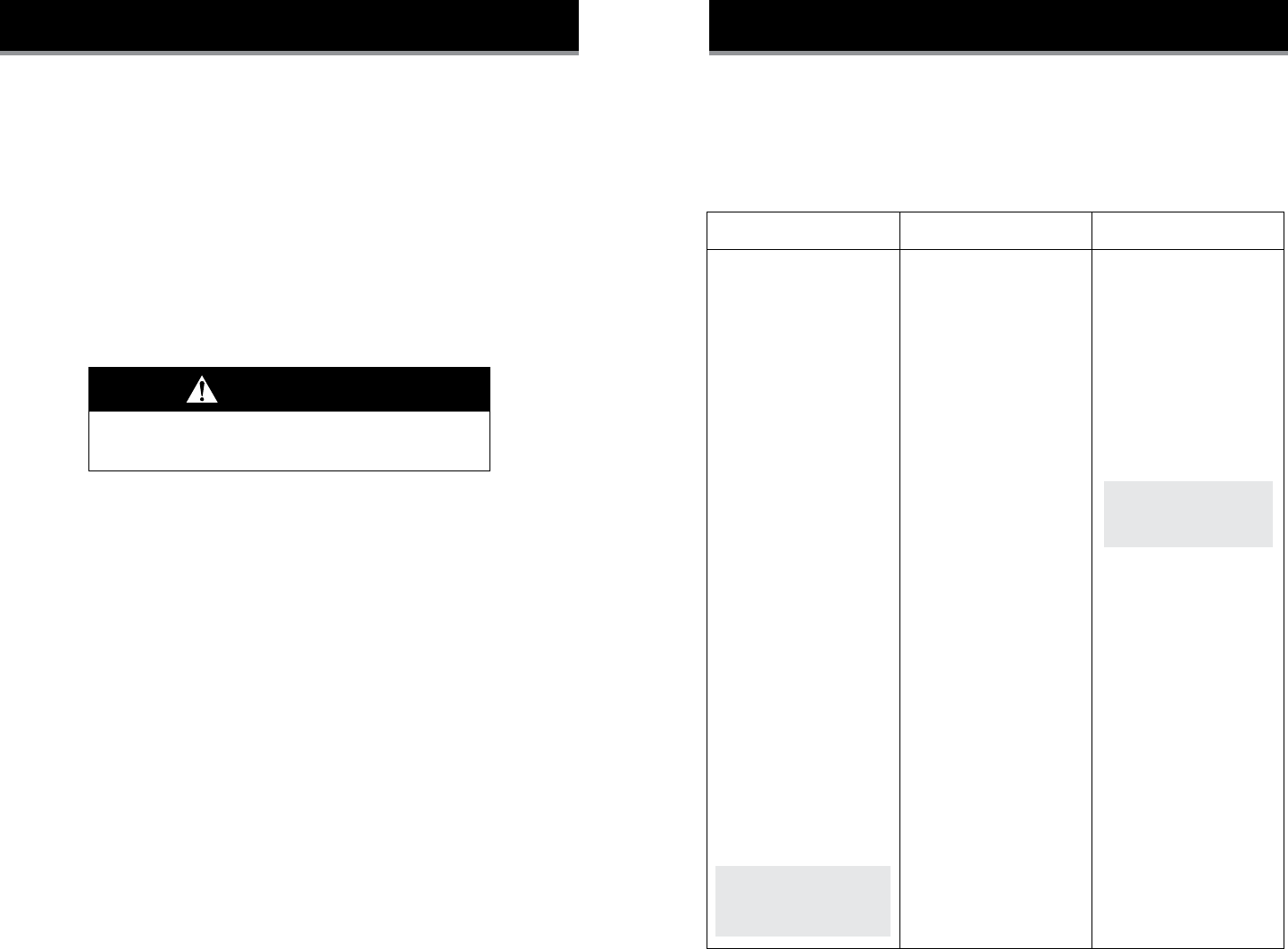
Page 6 Page 7
SAFETY INFORMATION SAFETY INFORMATION
GROUNDING INSTRUCTIONS
ELECTRICAL REQUIREMENTS
POWER SUPPLY CORD
The electrical requirements are a 120 volt 60 Hz, AC only, 20 amp. It is recommended
that a separate circuit serving only the oven be provided. The oven is equipped
with a 3-wire cord having a 3-prong grounding plug. It must be plugged into a wall
receptacle that is properly installed and grounded.
This appliance must be grounded. In the event of an electrical short circuit,
grounding reduces risk of electric shock by providing an escape wire for the electric
current. The cord provided with this appliance is equipped with a grounding wire and
a grounding plug. The plug must be plugged into an outlet that is properly installed
and grounded. Do not attempt to defeat this safety feature by modifying the plug in
any way.
1. A short power supply cord is provided to reduce the risk of becoming entangled in
or tripping over a longer cord.
2. If the power supply cord is too short, do not use an extension cord. Have a
qualied electrician or serviceman to install an outlet near the appliance.
3. If it is absolutely necessary to use longer cord sets or an extension cord, extreme
care must be exercised.
a) Use only a grounding type 3-wire extension cord that has a 3-blade grounding
plug and a 3-slot receptacle that will accept the plug on the appliance.
b) The marked electrical rating of the cord set or extension cord must equal to
or greater than the electrical rating of the appliance. The longer cord should be
arranged so that it will not drape over the counter top or table top where it can
be pulled on by children or tripped over unintentionally.
NOTE: Neither Westinghouse nor the dealer can accept any liability for damage to the oven or
personal injury resulting from failure to observe the electrical connection procedures.
Consult a qualied electrician or serviceman if:
1) The grounding instructions are not completely understood.
2) You are unsure that the appliance is properly grounded.
3) You have any questions about the grounding or electrical instructions.
WARNING
Improper use of the grounding plug can result in a risk
of electric shock.
UTENSIL GUIDE FOR THE MICROWAVE
CAN USE CAN NOT USE LIMITED USE
• Microwave browning
dish: For browning the
exterior of food such
as steaks, chops, or
pancakes. Follow the
directions provided with
your browning dish.
• Microwaveable plastic
wrap: For retaining
steam. Leave a small
opening for some steam
to escape. Avoid placing
it directly on the food.
• Paper towels and
napkins: To absorb
excess moisture and
prevent spattering.
Use for short-
term heating and
covering. Check for
manufacturer’s labels for
any special instructions.
• Oven-proof glass,
glass-ceramic bowls
and dishes: For use in
the microwave oven.
• Paper plates and cups:
For short-term heating
at low temperatures. Do
not use recycled paper,
which may contain
metal and could ignite.
NOTE: Recycled paper may
contain metal which could
ignite so please be careful.
• Aluminium foil:
Smooth, narrow strips
of foil may be used
to shield delicate
areas on food items
like drumsticks and
wings to prevent
overcooking. Keep all
aluminium foil at least
1 inch from the side
walls and the door of
the microwave.
NOTE: Using too much
foil can damage your
oven.
• Ceramic, porcelain,
and stoneware: Only
if they are labelled
“Microwave Safe”. If
they are not labelled,
test them to make
sure they can be used
safely.
• Plastic: Use only if
labelled “Microwave
Safe”. Use with care
because the plastic can
soften from the heat
of the food and some
plastic can melt.
This section lists which utensils can be used in the microwave, which have limited
use, and which should not be used in the microwave at all.
• Glass jars and
bottles: Regular glass
is too thin to be used
in a microwave. It
can shatter, causing
damage and injury.
• Paper bags: These are
a re hazard, they can
absorb heat and burn.
Only use popcorn bags
that are designed for
microwave use.
• Styrofoam plates and
cups: These can melt
and leave a harmful
chemical residue on
food.
• Plastic storage
and food containers:
Containers meant for
cold storage, such as
margarine tubs, can
melt in the microwave.
• Metal utensils: These
can damage your
microwave oven.
Remove all metal from
food and containers
before cooking.
• Parchment paper:
Use as a cover to
prevent spattering or
as a wrap for steaming.




